Please activate JavaScript in your browser to use all interface options.

- The largest tax payer in Russia
- 6% share in the global oil production
- 40% share in oil production in Russia
- 8% share in gas production in Russia
- 23% share of gas in the Company’s hydrocarbon production
- 13 big oil refineries in Russia
- 35% share in the Russian refining market
- About 3 thousand fuel filling stations in Russia
Rosneft operates in all of Russia's major oil and gas provinces including Western and Eastern Siberia, the Volga region, the Urals, the Far East, Timano-Pechora, Krasnodar Krai, and Russian offshore.
Rosneft is the undisputed leader of the "green" agenda among the fuel and energy complex of the Russian Federation.
ROSNEFT-2030 Strategy
Late in 2021 Rosneft Board of Directors approved the "Rosneft-2030: reliable energy and global energy transition" strategy. The key priorities of the new strategy are carbon footprint reduction, operational leadership and efficiency improvement.
The key goal of Rosneft long term development strategy is to achieve net carbon emission neutrality by 2050 for Scope 1 and Scope 2. Thus Rosneft has become the first company in the domestic oil and gas industry to set such strategic goal.
The Rosneft-2030 strategy defines the short- and medium-term horizons of the climate agenda: to reduce by 2025 absolute greenhouse gas emissions by 5%; to reduce by 2030 methane emissions to below 0.2%; achieve zero routine flaring of associated petroleum gas; reduce specific greenhouse gas emissions in the upstream segment to below 20 kg СО2/boe; to reduce absolute greenhouse gas emissions by more than 25% by 2035.
Carbon neutrality is the basis for Rosneft's strategic vision: to remain a reliable producer while minimizing the impact on the climate and the environment. This goal is to be achieved through measures to reduce emissions, use of low-carbon generation, development of energy-saving technologies, carbon capture and storage technologies, use of natural absorption potential as well as some other.
At the same time, the Rosneft-2030 strategy defines directions for the Company's development in all business segments: retain leadership in unit production costs, increase the share of gas in total production up to 25%, raise payments to Rosneft shareholders and increase profitability, implement actively circular economy principles, apply biodiversity preservation approaches, etc.
Exploration
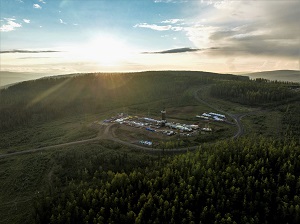 Rosneft is the world’s undisputed leader among public oil and gas companies in hydrocarbon reserves.
Rosneft is the world’s undisputed leader among public oil and gas companies in hydrocarbon reserves.
Based on the results of the audit of reserves according to the PRMS international classification (Hydrocarbon resource management system), as of December 31, 2022, the Company's 1P hydrocarbon reserves amounted to 42.3 billion boe, 2P - 84.2 billion boe, 3P - 132.4 billion boe. Production replacement by 2P reserves exceeds 100%.
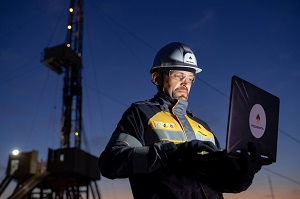 Rosneft performs exploration in all subsoil use regions of the Russian Federation, including the Russian Far East, Eastern and Western Siberia, Central Russia, Timano-Pechora and Southern Russia. In 2022 Rosneft carried out over 4.4 thousand square kilometers of 2D seismic and over 6.8 thousand square kilometers of 3D seismic onshore Russia. The tests of 64 exploration wells were completed at the success rate of 80%.
Rosneft performs exploration in all subsoil use regions of the Russian Federation, including the Russian Far East, Eastern and Western Siberia, Central Russia, Timano-Pechora and Southern Russia. In 2022 Rosneft carried out over 4.4 thousand square kilometers of 2D seismic and over 6.8 thousand square kilometers of 3D seismic onshore Russia. The tests of 64 exploration wells were completed at the success rate of 80%.
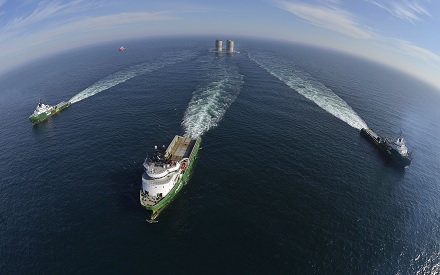 The Company is the biggest subsoil user on Russian offshore: Rosneft holds licenses for the development of 55 Russian continental offshore blocks. Hydrocarbon resources at these blocks are about 41.5 billion tons of oil equivalent. Rosneft implements a large-scale offshore exploration program, overdelivering its license commitments every year.
The Company is the biggest subsoil user on Russian offshore: Rosneft holds licenses for the development of 55 Russian continental offshore blocks. Hydrocarbon resources at these blocks are about 41.5 billion tons of oil equivalent. Rosneft implements a large-scale offshore exploration program, overdelivering its license commitments every year.
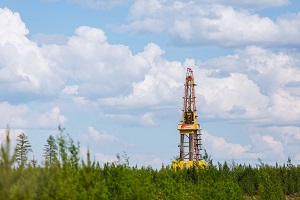
High efficiency of geological exploration allowed the Company to discover 7 fields and 153 new hydrocarbon deposits with reserves of circa 0.3 billion tons of oil equivalent under the AB1C1+B2C2 category. The most significant discoveries include the Madachagskoye filed on the Pechora Sea shelf with recoverable oil reserves of 82.3 mln tons under the AB1C1+B2C2 category. This is the largest discovery in the Russian Federation in 2022. As a result, the Company's hydrocarbon reserves under the Russian classification as of December 31, 2022 amounted to 159.3 billion boe (21.5 billion tons of oil equivalent) under the AB1C1+B2C2 category.
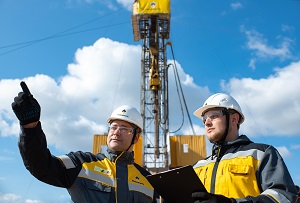 Also among the most prominent discoveries of Rosneft in recent years are the world's largest fields: Zapadno-Irkinskoye oil field in the Krasnoyarsk Krai, and Zhukov gas field and Rokossovsky gas field on the Kara Sea offshore. Their total potential is estimated at 4 billion barrels of oil equivalent. Besides, in 2021 the Company discovered a unique reserve-rich gas condensate field named after Е.Zinichev in the Krasnoyarsk Krai with recoverable АВ1С1+В2С2 gas reserves of 384 bcm, and also a large Kederginskoye gas field in Yakutia with recoverable АВ1С1+В2С2 gas reserves over 43 bcm.
Also among the most prominent discoveries of Rosneft in recent years are the world's largest fields: Zapadno-Irkinskoye oil field in the Krasnoyarsk Krai, and Zhukov gas field and Rokossovsky gas field on the Kara Sea offshore. Their total potential is estimated at 4 billion barrels of oil equivalent. Besides, in 2021 the Company discovered a unique reserve-rich gas condensate field named after Е.Zinichev in the Krasnoyarsk Krai with recoverable АВ1С1+В2С2 gas reserves of 384 bcm, and also a large Kederginskoye gas field in Yakutia with recoverable АВ1С1+В2С2 gas reserves over 43 bcm.
Production and Development
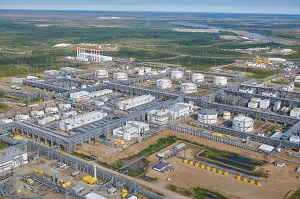 The efficient management of the production assets portfolio and of investments in the development of new fields enables Rosneft to ensure stable present and future growth of hydrocarbon production.
The efficient management of the production assets portfolio and of investments in the development of new fields enables Rosneft to ensure stable present and future growth of hydrocarbon production.
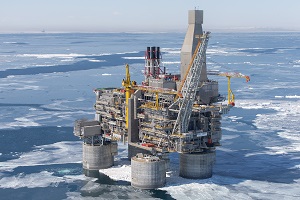 Rosneft is the biggest oil producer company in the Russian Federation, its share in overal production being over 40%. In the year of 2022 the Company's liquid production reached 5.10 mln boe per day. At the same time, due to the production resumption at the Sakhalin-1 project in Q4 2022, the average daily hydrocarbon production rose to 5.50 mln boe.
Rosneft is the biggest oil producer company in the Russian Federation, its share in overal production being over 40%. In the year of 2022 the Company's liquid production reached 5.10 mln boe per day. At the same time, due to the production resumption at the Sakhalin-1 project in Q4 2022, the average daily hydrocarbon production rose to 5.50 mln boe.
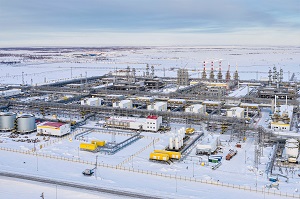 Rosneft is also one of the largest independent gas producers in Russia. In 2022 gas production reached a new historical maximum of 74.4 billion cubic meters.
Rosneft is also one of the largest independent gas producers in Russia. In 2022 gas production reached a new historical maximum of 74.4 billion cubic meters.
As part of its development strategy, by the year of 2025 Rosneft plans to increase the share of gas in its total hydrocarbon production to 25%.
Vostok Oil Flagship Project
In 2020 Rosneft launched the Vostok Oil project, the largest in the global oil and gas industry.
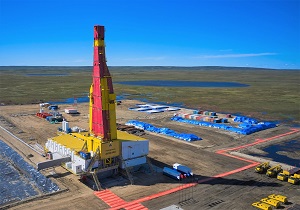 It now comprises 52 license areas in the north of the Krasnoyarsk Krai and Yamal-Nenets Autonomous District, where 13 oil and gas fields are located, including the fields of the Vankor Cluster (such as Vankor, Suzun, Tagul and Lodochnoye fields) and the Payakha Cluster. The project resource base is 6.5 billion tons. This estimate was confirmed by large-scale geological exploration, as well as by detailed reports of world-class experts and international auditors.
It now comprises 52 license areas in the north of the Krasnoyarsk Krai and Yamal-Nenets Autonomous District, where 13 oil and gas fields are located, including the fields of the Vankor Cluster (such as Vankor, Suzun, Tagul and Lodochnoye fields) and the Payakha Cluster. The project resource base is 6.5 billion tons. This estimate was confirmed by large-scale geological exploration, as well as by detailed reports of world-class experts and international auditors.
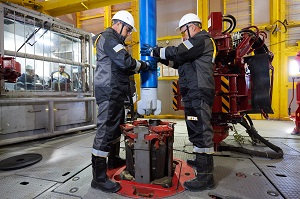 The exploration results are many times higher than the forecasts, and thus they enable us to confidently project high production levels for many decades ahead with a phased ramp-up to 115 million tons of oil by 2033. The logistical advantage of the Vostok Oil project is the possibility to supply raw materials from the fields to all international markets, especially to the Asia-Pacific region.
The exploration results are many times higher than the forecasts, and thus they enable us to confidently project high production levels for many decades ahead with a phased ramp-up to 115 million tons of oil by 2033. The logistical advantage of the Vostok Oil project is the possibility to supply raw materials from the fields to all international markets, especially to the Asia-Pacific region.
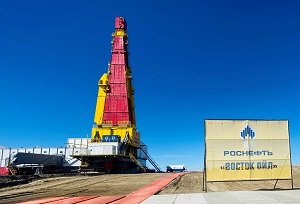 The record-low unit lifting costs as well as the low carbon footprint (it is only a quarter of the global average for new projects) make the Vostok Oil one of the most environmentally friendly and "greenest" oil production projects in the world. Crude oil of the Vostok Oil project is unique in its composition: it is a light low-sulfur crude of premium quality with 0.01% to 0.1% sulfur content. This number is comparable with the Euro-3 standard for diesel fuel. In fact, these are "green barrels" that are produced through advanced technologies. Their production may considerably reduce or even exclude the demand for certain installations at refineries thus significantly diminishing greenhouse gas emissions.
The record-low unit lifting costs as well as the low carbon footprint (it is only a quarter of the global average for new projects) make the Vostok Oil one of the most environmentally friendly and "greenest" oil production projects in the world. Crude oil of the Vostok Oil project is unique in its composition: it is a light low-sulfur crude of premium quality with 0.01% to 0.1% sulfur content. This number is comparable with the Euro-3 standard for diesel fuel. In fact, these are "green barrels" that are produced through advanced technologies. Their production may considerably reduce or even exclude the demand for certain installations at refineries thus significantly diminishing greenhouse gas emissions.
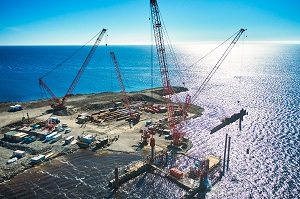 Besides the traditional thermal generation, the Vostok Oil energy system will also integrate wind power generation, which is a unique feature of the project. The maximum capacity of the wind farm can be up to 200 MW. A distinctive feature of the project is that it utilizes almost 100% of associated petroleum gas, which is used for its own energy needs.
Besides the traditional thermal generation, the Vostok Oil energy system will also integrate wind power generation, which is a unique feature of the project. The maximum capacity of the wind farm can be up to 200 MW. A distinctive feature of the project is that it utilizes almost 100% of associated petroleum gas, which is used for its own energy needs.
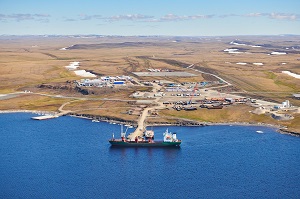 The key oil transport artery of the Vostok Oil project will be a unique pipeline about 770 km long. This trunk pipeline will deliver the Vostok Oil's commercial oil to the Sever Bay Port. The new oil pipeline system will include both the existing infrastructure facilities of the Vankor cluster, and also those that will be built on the Taimyr Peninsula in the coming years.
The key oil transport artery of the Vostok Oil project will be a unique pipeline about 770 km long. This trunk pipeline will deliver the Vostok Oil's commercial oil to the Sever Bay Port. The new oil pipeline system will include both the existing infrastructure facilities of the Vankor cluster, and also those that will be built on the Taimyr Peninsula in the coming years.
The project is focused on a wide application of in-house and Russian solutions: over 99% of equipment and components at the Vostok Oil power facilities are domestically produced.
Oil Refining and Gas Processing
Rosneft is the Russian refining industry leader. The Company accounts for more than 35% of Russian refining output. In 2022 the Company refined 94.4 million tons of crude.
The Company oil refining and petrochemical block includes 13 large refineries, and also three petrochemical facilities, four gas processing facilities, three catalyst manufacturing plants and one service company.
Rosneft is implementing the industry-largest refinery upgrade program, which includes the refurbishment of the Komsomolsk refinery, upgrade of the Ryazan refinery and Tuapse refinery, refurbishment and upgrade of the Achinsk refinery, the Angarsk Petrochemical Company and Samara group plants. The total volume of investments into the program exceeds 1 trillion Rubles.
Rosneft petrochemical complex includes the Angarsk Polymer Plant, the Novokuibyshevsk Petrochemical Company, and the Ufaorgsintez. Besides that, the petrochemical business represents the aromatics production center at Bashneft-Ufaneftekhim, and also the facilities making methanol, butyl alcohols, and amines at the Angarsk Petrochemical Company.
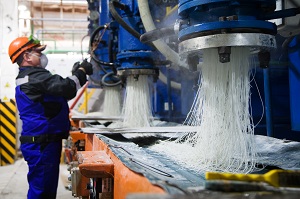 Rosneft holds a leading position in the domestic market of catalysts for petrochemical industry. The Company's Angarsk Catalyst Plant, Novokuibyshev Catalyst Plant, and RN-Kat fabricate products that are on par with the world's best analogues and even exceed those in certain parameters.
Rosneft holds a leading position in the domestic market of catalysts for petrochemical industry. The Company's Angarsk Catalyst Plant, Novokuibyshev Catalyst Plant, and RN-Kat fabricate products that are on par with the world's best analogues and even exceed those in certain parameters.
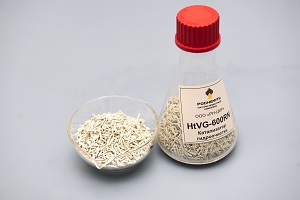 Since 2020 Rosneft has completely abandoned the import and turned to the use of its in-house produced hydrotreatment and hydrocracking catalysts only. This helped solve the most important strategic task of reducing the dependency of the domestic oil refining industry upon imported catalysts. In 2022 the Company began exporting its in-house produced catalysts abroad.
Since 2020 Rosneft has completely abandoned the import and turned to the use of its in-house produced hydrotreatment and hydrocracking catalysts only. This helped solve the most important strategic task of reducing the dependency of the domestic oil refining industry upon imported catalysts. In 2022 the Company began exporting its in-house produced catalysts abroad.
Rosneft owns a stake (49.13%) in the Indian company Nayara Energy, which includes a refinery in the city of Vadinar with the capacity of 20 million tons per annum. This refinery is the second largest in India and one of the most technologically advanced refineries in the world. The Indian company is implementing the Refinery Upgrade Program: Stage 1 envisages the construction of polypropylene production units for up to 450 thousand tons per annum. The Nayara Energy business also includes a deep-water port capable of receiving the ultra-large VLCC tankers, and also one of the largest fuel retail networks in India with more than 6,500 filling stations.
Fuel supplies and retail sales
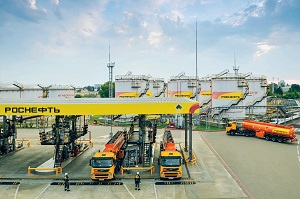 In the reporting year Rosneft continued to fully meet the growing needs of the domestic market for high-quality motor fuels. The scopes of petroleum product domestic sales in 2022 reached the record of 42.1 mln t, which is 6.0% increase year-on-year.
In the reporting year Rosneft continued to fully meet the growing needs of the domestic market for high-quality motor fuels. The scopes of petroleum product domestic sales in 2022 reached the record of 42.1 mln t, which is 6.0% increase year-on-year.
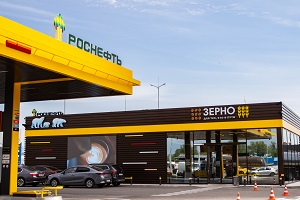 The Rosneft retail network is the largest in Russia in terms of its geographical coverage and the number of stations, whereas the Rosneft brand of filling stations is one of the Russian leaders in its recognition and fuel quality.
The Rosneft retail network is the largest in Russia in terms of its geographical coverage and the number of stations, whereas the Rosneft brand of filling stations is one of the Russian leaders in its recognition and fuel quality.
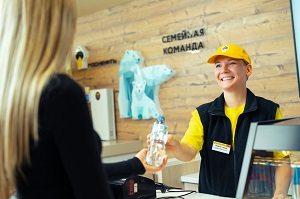 The geography of Rosneft retail business covers 61 regions of Russia. At the same time, the Company operates about 3,000 filling stations in Russia, Belarus, Kyrgyzstan and Abkhazia. These filling stations have shops, cafes, pharmacies, postamats and dry clean counters. The Company is also promoting a new customer service line at its filling stations – which is food trucks (mobile retail outlets).
The geography of Rosneft retail business covers 61 regions of Russia. At the same time, the Company operates about 3,000 filling stations in Russia, Belarus, Kyrgyzstan and Abkhazia. These filling stations have shops, cafes, pharmacies, postamats and dry clean counters. The Company is also promoting a new customer service line at its filling stations – which is food trucks (mobile retail outlets). The service of “cafe on wheels” is available now at filling stations in Saint-Petersburg, as well as on the federal highway between Saint-Petersburg and the Republic of Karelia, and in Arkhangelsk. The Company retail and sales complex has 116 oil bases, and also a fleet of 915 fuel trucks.
The service of “cafe on wheels” is available now at filling stations in Saint-Petersburg, as well as on the federal highway between Saint-Petersburg and the Republic of Karelia, and in Arkhangelsk. The Company retail and sales complex has 116 oil bases, and also a fleet of 915 fuel trucks.
The Company is also implementing a program of filling stations for compressed natural gas (CNG). Today the network of gas stations and station modules includes 21 outlets in Voronezh, Saratov, Orenburg and Ulyanovsk Oblasts, Stavropol Krai, Ingushetia, Mordovia and Udmurtia. By the year of 2028 Rosneft intends to launch up to 200 gas filling stations under its Gas Filling Infrastructure Development Program.
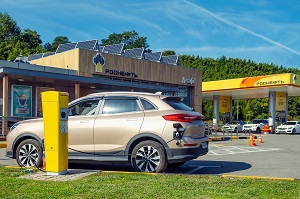 Rosneft equips its filling stations with charging infrastructure for electric vehicles. Rosneft filling stations have 55 charging units in the city of St. Petersburg, as well as in the Leningrad Oblast, Moscow Oblast, Tver Oblast, Lipetsk Oblast and Voronezh Oblast, Krasnodar Krai and the Republic of Buryatia.
Rosneft equips its filling stations with charging infrastructure for electric vehicles. Rosneft filling stations have 55 charging units in the city of St. Petersburg, as well as in the Leningrad Oblast, Moscow Oblast, Tver Oblast, Lipetsk Oblast and Voronezh Oblast, Krasnodar Krai and the Republic of Buryatia.
One of Rosneft’s priorities is to expand its premium product sales channels, including airport fueling, bunkering and bitumen segments.
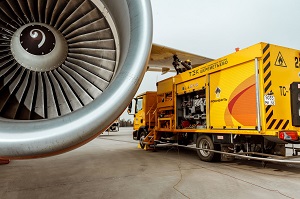 Rosneft performs the “into-plane” fueling at 40 airports in Russia and abroad. The bunkering business of Rosneft covers all key seaports and river ports in Russia. In the bitumen segment Rosneft is developing the manufacturing and sales of high-tech modern materials for road construction, foremost such as modified products, which help significantly improve the quality of road surfaces.
Rosneft performs the “into-plane” fueling at 40 airports in Russia and abroad. The bunkering business of Rosneft covers all key seaports and river ports in Russia. In the bitumen segment Rosneft is developing the manufacturing and sales of high-tech modern materials for road construction, foremost such as modified products, which help significantly improve the quality of road surfaces.
The Far East Shipyard
Upon the assignment of the President of Russia, Rosneft is implementing a large-scale project to set up a shipbuilding cluster in the Far East, which core will be Zvezda Shipyard in the town of Bolshoi Kamen. The construction of the shipyard is carried out in two phases. The facilities from Extended phase No. 1, which were commissioned in 2016 and 2017 (hull workshop, paintshops and heavy-duty open outfitting slipway) are already in operation.
In September 2016 in his speech at the ceremonial launch of the shipyard first phase, the President of the Russian Federation Vladimir Putin said, "We have every reason to believe that the new facility will be better than our main international rivals in many aspects."
According to the Head of state, the development of civil shipbuilding and the commissioning of new production facilities is one of the key strategic tasks for the strengthening of the Russian Far East industrial potential. The President noted the importance of implementing the Rosneft comprehensive strategy in the Russian Far East, which aims to build up oil and gas production and processing facilities and also to support research activities, implement social projects and create infrastructure for quality growth. “All this is evidence of a fundamental and responsible approach to business, which should become the reference point for other large Russian and foreign companies ready to invest in the Russian Far East,” said the President of the Russian Federation.
One of the key facilities of Phase 1 is an open heavy-duty outfitting slipway. It is a sophisticated engineering structure of 12 hectares in area. The slipway is equipped with four 100-ton gantries, two 320-ton overhead cranes and a 1200-ton Goliath crane that has no analogues at Russian shipyards.
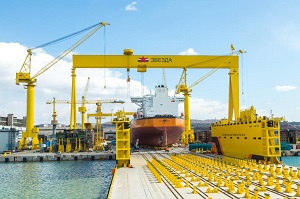 Cranes of this type allow for concurrent construction of several vessels out of large blocks (at the existing Russian shipyards the maximum crane capacity does not exceed 500 tons). Thereby, now Russia can build ships and offshore facilities 300 meters long and 75 meters wide.
Cranes of this type allow for concurrent construction of several vessels out of large blocks (at the existing Russian shipyards the maximum crane capacity does not exceed 500 tons). Thereby, now Russia can build ships and offshore facilities 300 meters long and 75 meters wide.
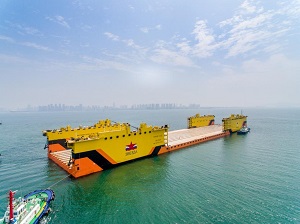 In July of 2018 Zvezda Shipyard received a transport & transfer floating dock for 40,000 tons of loading capacity. It is intended to launch large-size vessels of around 300 meters long and over 50 meters wide with a launching weight of up to 40,000 tons and a deadweight of up to 350,000 tons, as well as to launch marine facilities such as drilling platforms and their elements without using special devices, and to ensure high quality and safety of the launch.
In July of 2018 Zvezda Shipyard received a transport & transfer floating dock for 40,000 tons of loading capacity. It is intended to launch large-size vessels of around 300 meters long and over 50 meters wide with a launching weight of up to 40,000 tons and a deadweight of up to 350,000 tons, as well as to launch marine facilities such as drilling platforms and their elements without using special devices, and to ensure high quality and safety of the launch.
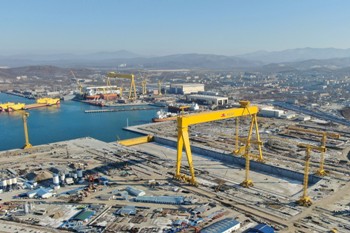 In December of 2021 or 3 years ahead of schedule, the Zvezda Shipyard dry dock was commissioned to become the largest dock in Russia and one of the largest in the world. Phase 2 of the shipyard construction is scheduled to be commissioned in 2024. The facilities of the second phase include additional full cycle manufacturing workshops to build high-tonnage vessels and marine facilities.
In December of 2021 or 3 years ahead of schedule, the Zvezda Shipyard dry dock was commissioned to become the largest dock in Russia and one of the largest in the world. Phase 2 of the shipyard construction is scheduled to be commissioned in 2024. The facilities of the second phase include additional full cycle manufacturing workshops to build high-tonnage vessels and marine facilities.
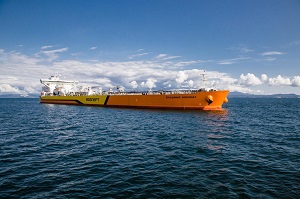 The Zvezda Shipyard product line includes high-tech and high-tonnage vessels, offshore drilling rigs, exploration and production platforms, service vessels, including ice-class ships. There shipyard’s portfolio of orders lists more than 60 vessels. They have already launched three Aframax oil tankers, two of which are already transporting oil, as well as the Katerina Velikaya multipurpose vessel. Zvezda Shipyard is building the Russia flagship, which is the head nuclear icebreaker of the "Leader" project. The vessel will become the most powerful nuclear ship in the history of the global shipbuilding. This highly technically sophisticated project has no analogues worldwide. Its key objective is to provide for a year-round piloting of commercial fleets along the Northern Sea Route. The "Leader" project will become the basis of the Russian new generation icebreaker fleet.
The Zvezda Shipyard product line includes high-tech and high-tonnage vessels, offshore drilling rigs, exploration and production platforms, service vessels, including ice-class ships. There shipyard’s portfolio of orders lists more than 60 vessels. They have already launched three Aframax oil tankers, two of which are already transporting oil, as well as the Katerina Velikaya multipurpose vessel. Zvezda Shipyard is building the Russia flagship, which is the head nuclear icebreaker of the "Leader" project. The vessel will become the most powerful nuclear ship in the history of the global shipbuilding. This highly technically sophisticated project has no analogues worldwide. Its key objective is to provide for a year-round piloting of commercial fleets along the Northern Sea Route. The "Leader" project will become the basis of the Russian new generation icebreaker fleet.
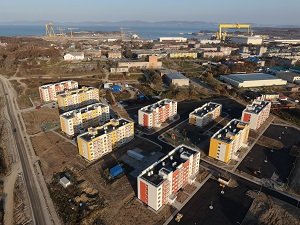 By 2024 the shipyard will be employing over 7,500 highly qualified specialists. A new residential district called Parkovy is under construction for them in the town of Bolshoi Kamen. In July of 2022 the shipbuilders celebrated housewarming parties in the first two residential houses built at the expense of Rosneft. There will be a total of 10 residential buildings with playgrounds and sports grounds in the area.
By 2024 the shipyard will be employing over 7,500 highly qualified specialists. A new residential district called Parkovy is under construction for them in the town of Bolshoi Kamen. In July of 2022 the shipbuilders celebrated housewarming parties in the first two residential houses built at the expense of Rosneft. There will be a total of 10 residential buildings with playgrounds and sports grounds in the area.
Sustainable Development (ESG)
The basis of Rosneft strategy is to construct its business in line with the highest health, safety and environmental requirements. Since 2010 Rosneft has been a member of the UN Global Compact, and has published its Sustainable development reports every year.
Rosneft's mission, as well as its values, guidelines and strategic principles are consistent with the 17 UN Sustainable Development Goals. The Company has defined five priority goals, which will be facilitated through its core business: Good Health and Well-Being, Affordable and Clean Energy, Decent Work and Economic Growth, Climate Change Response, Partnership for Sustainable Development.
In December of 2021 the Company Board of Directors approved a new development program: "Rosneft-2030: Reliable Energy and Global Energy Transition". Under this strategy Rosneft aims to achieve net carbon neutrality by 2050.
In the year of 2021 Rosneft became the only Russian oil and gas company to be awarded the status of a sustainable development leader and to be included into the Global Compact LEAD initiative for its steadfast commitment to the United Nations Global Compact and its Ten Principles of Responsible Business.
Rosneft directly facilitates the implementation of the 17 UN goals not only under its core business, but also through its support of various projects and initiatives aimed to improve the standards of living in its regions of operations, develop healthcare, science and education, culture, and protect the environment.
In the year of 2022 Rosneft was for the seventh consecutive time placed among the leaders of the Russian ESG stock indices, including the Moscow Exchange-RUIE (the Russian Union of Industrialists and Entrepreneurs) Responsibility and Openness Index and the Moscow Exchange-RUIE Sustainable Development Vector Index. The Company was granted the highest level in the ESG rating of sustainable corporate governance by the University of Perugia (Italy) and the "Yes-Strategy" Corporate Development Agency.
Science and Innovations
 Rosneft is a leader of innovative change in the Russian oil and gas industry. The Company’s efforts are targeted at developing the industry intellectual and technological potential based on the strong foundation of the Russian oil and gas school, which is one of the best in the world.
Rosneft is a leader of innovative change in the Russian oil and gas industry. The Company’s efforts are targeted at developing the industry intellectual and technological potential based on the strong foundation of the Russian oil and gas school, which is one of the best in the world.
 Rosneft has formed the largest in Europe research and development complex, which owns a large-scale infrastructure and outstanding R&D potential: it comprises 30 institutes that employ 18.5 thousand highly qualified specialists. The Company research and development complex is represented in all regions of the Company's operations, as well as abroad. At the same time, the application interests of the complex scientists embrace all business segments from field development to retail.
Rosneft has formed the largest in Europe research and development complex, which owns a large-scale infrastructure and outstanding R&D potential: it comprises 30 institutes that employ 18.5 thousand highly qualified specialists. The Company research and development complex is represented in all regions of the Company's operations, as well as abroad. At the same time, the application interests of the complex scientists embrace all business segments from field development to retail.
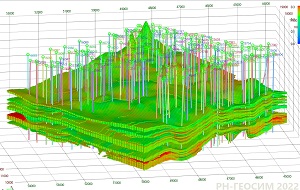 The R&D complex specialists have elaborated more than 16 software packages for geology, oil production and refining, including RN-GRID software package for the modeling of hydraulic fracturing jobs (GRP), RN-GEOSIM, RN-KIM, RN-SIGMA and others. Under the digital transformation and IT technology development over 50 thousand of digital twins of wells and production facilities have been implemented. The Digital Field and Digital Refinery projects have been launched.
The R&D complex specialists have elaborated more than 16 software packages for geology, oil production and refining, including RN-GRID software package for the modeling of hydraulic fracturing jobs (GRP), RN-GEOSIM, RN-KIM, RN-SIGMA and others. Under the digital transformation and IT technology development over 50 thousand of digital twins of wells and production facilities have been implemented. The Digital Field and Digital Refinery projects have been launched. 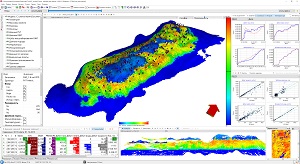 The Company software products exceed their foreign analogues in the number of tasks processed and in the speed of calculations performed.
The Company software products exceed their foreign analogues in the number of tasks processed and in the speed of calculations performed. 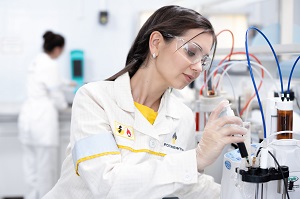 Rosneft software quality and efficiency are also proven by its successful commercialization: the licenses for 10 of the Company's unique products have been exported to foreign markets. Rosneft uses 74% of its own software for exploration and production, and in areas like hydrodynamic modeling, hydraulic fracturing design, and geonavigation this number is 100%. The effect from the introduction of in-house IT solutions is already about 10 billion Rubles.
Rosneft software quality and efficiency are also proven by its successful commercialization: the licenses for 10 of the Company's unique products have been exported to foreign markets. Rosneft uses 74% of its own software for exploration and production, and in areas like hydrodynamic modeling, hydraulic fracturing design, and geonavigation this number is 100%. The effect from the introduction of in-house IT solutions is already about 10 billion Rubles.
Under the implementation of its Innovation Development Program, Rosneft has created a portfolio of 118 target innovation projects and put in place continuous full scale commissioning of new technologies, which are offered by manufacturers for the first time, and also those already successfully tested in the oil and gas practices. 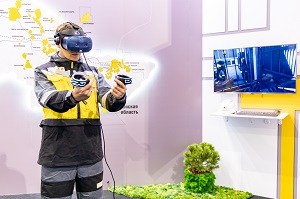 The testing and implementation of technologies is carried out at several levels depending on the strategic importance and roll-out scale, as well as at pilot tests.
The testing and implementation of technologies is carried out at several levels depending on the strategic importance and roll-out scale, as well as at pilot tests.
Rosneft relies on accelerated business digitalization, industrial Internet technologies, which will fundamentally strengthen control over material flows and eliminate the factor of human error.
Environmental Protection
Rosneft pays priority attention to environmental protection and preservation and recovery of natural resources.
The Company's "green" investments aimed to make its business more environmentally friendly and minimize the environmental footprint amounted to about 270 billion Rubles over a 5-year period (from 2018 to 2022).
The Company's environmental initiatives include rational utilization of associated petroleum gas, reduction of greenhouse gas emissions and improvement of their capture and storage technologies, optimization of water treatment and water disposal processes, land reclamation and protection of ecosystems. Even now all key Company subsidiaries have achieved 99% of APG utilization rate through the creation of infrastructure to collect, utilize and supply gas to consumers or reinject it back into the formation.
In the sphere of natural resources preservation, the Company actively implements the principles of "circular economy" ("closed cycle economy"), which implies waste-free manufacturing technologies, recycling and recovery of resources.
Rosneft carries out a number of comprehensive programs to preserve and recover natural resources. An important part of Rosneft strategy is the natural absorption mechanism. The Company is already significantly facilitating the absorption of greenhouse gas emissions by forests through planting trees in its regions of operation every year. Within the period from 2020 to 2022 alone, Rosneft subsidiaries planted over 18 million seedlings and young trees.
In the year of 2022 the Company launched the world's largest forest-climatic project. The array of forestry measures envisages a cumulative absorption potential of 10 million tons of CO2-equivalent. Rosneft's forest-climatic project is intended not only to significantly contribute to greenhouse gas absorption and help develop a methodological framework to build appropriate mathematical balance models, but also to facilitate the creation of a regulatory framework for the market of carbon units (CU).
The Company pays special attention to measures of the reproduction of aquatic biological resources. The Group subsidiaries provide for the reproduction of fish fry and its releasing into river systems (from 2020 to 2022 the Company subsidiaries released about 230 million fish juveniles).
Under the project of the Arctic Research Center (part of Rosneft Corporate R&D) and the Innopraktika Non-government Development Institute on the basis of the Biology Department of the Lomonosov Moscow State University, Russian scientists made a prototype of a unique biological product for cleaning the coastline and waters of the Northern seas of oil and oil product spills. The technology is based on the application of natural psychrophilic (cold-loving) microorganisms, which use hydrocarbons for food.
In July of 2012 Rosneft sent two research vessels to the northern seas for the first time to study runoff winds blowing from Novaya Zemlya. That expedition set off the most substantial Arctic research in the modern history. Over the subsequent period of 10 years Rosneft conducted about 40 integrated expeditions, many of which are unique. With the help of high-tech Russian equipment, they studied 90% of the Russian Arctic glaciers. These studies have practical objectives, which are among other things related to the development of the Northern Sea Route and control over ice conditions at high latitudes.
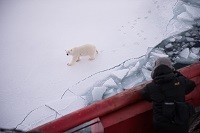 The Company implements projects aimed to study and protect Arctic animals and birds, which are indicators of the sustainable standing of the regional ecosystems. By the same token expeditions went to study the polar bear, Atlantic walrus, wild reindeer, Siberian sable and Ivory gull, which are recorded in the Red Books of various levels. The results of studies are the basis for planning the Company's operations and organizing environmental monitoring.
The Company implements projects aimed to study and protect Arctic animals and birds, which are indicators of the sustainable standing of the regional ecosystems. By the same token expeditions went to study the polar bear, Atlantic walrus, wild reindeer, Siberian sable and Ivory gull, which are recorded in the Red Books of various levels. The results of studies are the basis for planning the Company's operations and organizing environmental monitoring.
The Company is sponsoring programs on the protection and reproduction of rare animals – such as the Amur tiger, polar bear, Atlantic walrus, Ivory gull, and wild reindeer.
Rosneft is patronizing polar bears in all zoos all over the country and financing the construction of new dwellings to make the living conditions of bears as comfortable and similar to their natural habitat as possible.
Social Responsibility
Rosneft implements social programs in all regions of presence: it builds modern hospitals, sports complexes, ice arenas, schools and kindergartens.
The Company has strategic cooperation agreements with local goverments. This first and foremost envisions the development of social infrastructure. Large-scale projects are underway, which will completely change the appearance of cities and towns and will provide local residents with a direct access to up-to-date services of health care, education, sports and recreation, and housing and utilities.
The Company subsidiaries are often the major employer at their locations and so they assume commitments to maintain streets and roads, build bridges, repair utilities and transportation networks, electricity and heating facilities, as well as replace equipment.
Rosneft implements dozens of projects related to the support of healthcare and development of medicine. It allocates significant funds for the construction, capital repair and reconstruction of healthcare facilities (clinics, hospitals, medical centers), improvement of their infrastructure, as well as purchase of new medical and diagnostic equipment. Among the key social projects in this area are the launch of a multifunctional medical center in Gelendzhik, a new building of the children's hospital in Saratov, and also the setup of a comprehensive emergency response system for first aid medical service in the Arctic.
Another important priority of the social policy of Rosneft and its subsidiaries is the support of sports. The Company funded the construction of ice arenas, sports complexes and multi-functional sports grounds in the regions of presence.
The Company provides support to amateur sports as well as professional sports. Rosneft owns CSKA Hockey Club, and it also finances Arsenal Football Club in Tula, it sponsors Lada Sport Rosneft racing team as the general sponsor, and helps Russian sambo wrestlers and facilitates various regional sports development programs.
Rosneft actively participates in significant events and activities of the Russian cultural life. The Company allocates funds for projects that define the cultural image of the country, also influence the national identity and form the public understanding of high culture. This includes the support of the Shostakovich St. Petersburg Academic Philharmonia, the Boris Eifman Ballet, the Sretensky Monastery Choir as well as such prominent cultural events as exhibitions of Thomas Gainsborough’s paintings and Edo paintings in the Pushkin Museum of Fine Arts, as well as the paintings of Rafael in the State Hermitage Museum. In the year of 2019 Rosneft helped the Hermitage Museum to reanimate the Ancient World Section Gallery. For almost 40 years before, this unmatched museum space had been closed to the public. After a major restoration, the Gallery regained its historical appearance and became a venue for the “Ancient Colonization of the Northern Black Sea Region” permanent exhibition.
Rosneft is the general sponsor of the White Steamboat Children's Music Festival, which is a charity project for disadvantaged children. Talented children get education in a unique summer singing and chorus school under the guidance of high-skilled professional tutors of singing, acting techniques, choral singing, musical instruments and choreography, and then they perform at gala concerts at major concert venues in Russia.

-315xx70.png)